Examining the Debate: Global Citizenship Replacing National Identity?
VerifiedAdded on 2020/12/29
|8
|2444
|147
Essay
AI Summary
This essay examines the multifaceted relationship between global citizenship and national identity. It begins by defining global citizenship, highlighting its emphasis on global awareness, responsibility, and participation in addressing global issues, while also acknowledging the role of national identity, encompassing cultural, traditional, and linguistic aspects. The essay explores the arguments for and against the notion of global citizenship potentially replacing national identity, drawing upon the views of various authors. It analyzes the benefits and drawbacks of both concepts, considering how they intersect and influence individual and collective identities. The conclusion reinforces that global citizenship and national identity are not mutually exclusive, but are rather interdependent, with each contributing to a more sustainable and equitable world. It emphasizes that global citizenship does not necessarily negate national identity, and in some cases, the latter may take precedence, but both play crucial roles in shaping individual perspectives and global interactions.
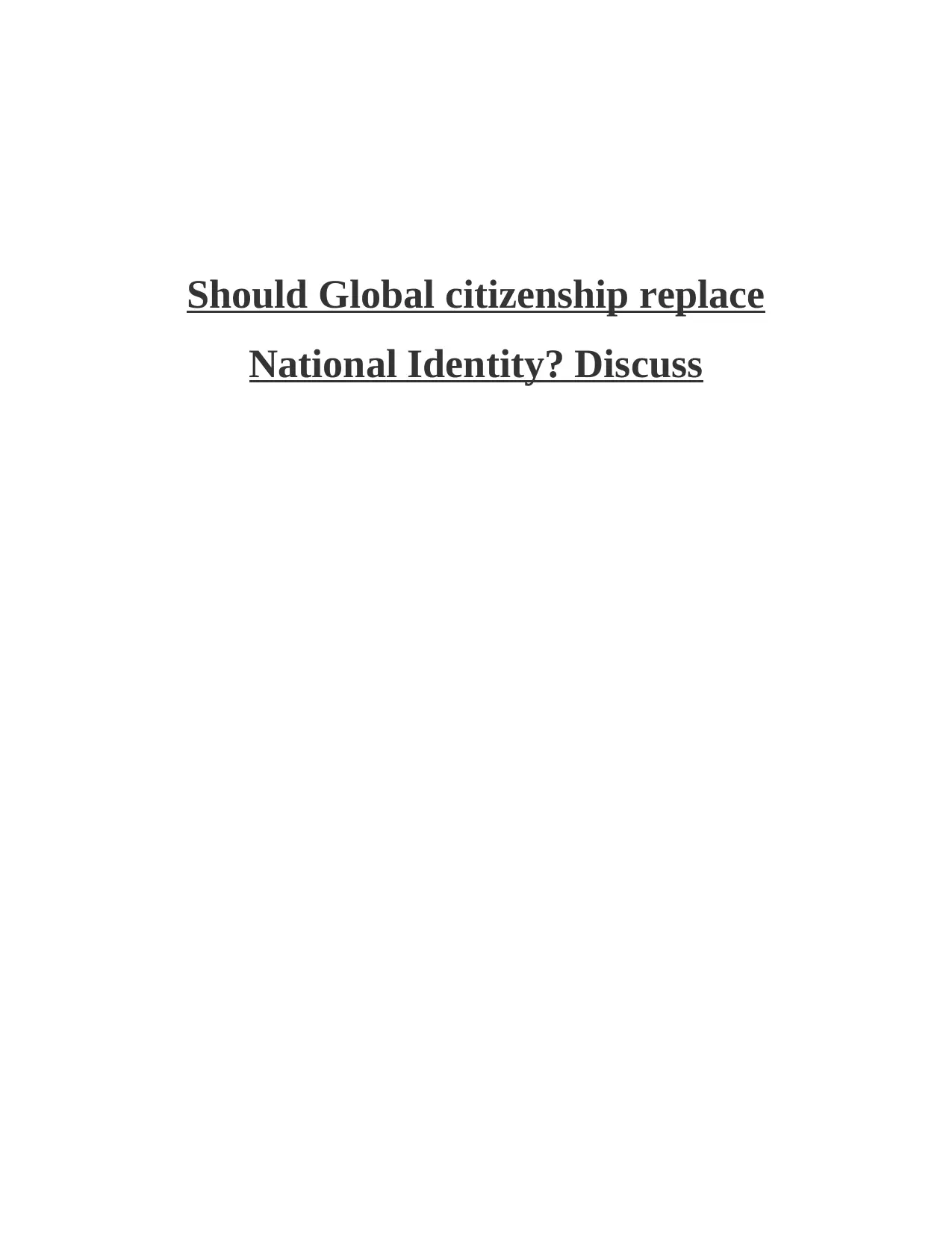
Should Global citizenship replace
National Identity? Discuss
National Identity? Discuss
Paraphrase This Document
Need a fresh take? Get an instant paraphrase of this document with our AI Paraphraser
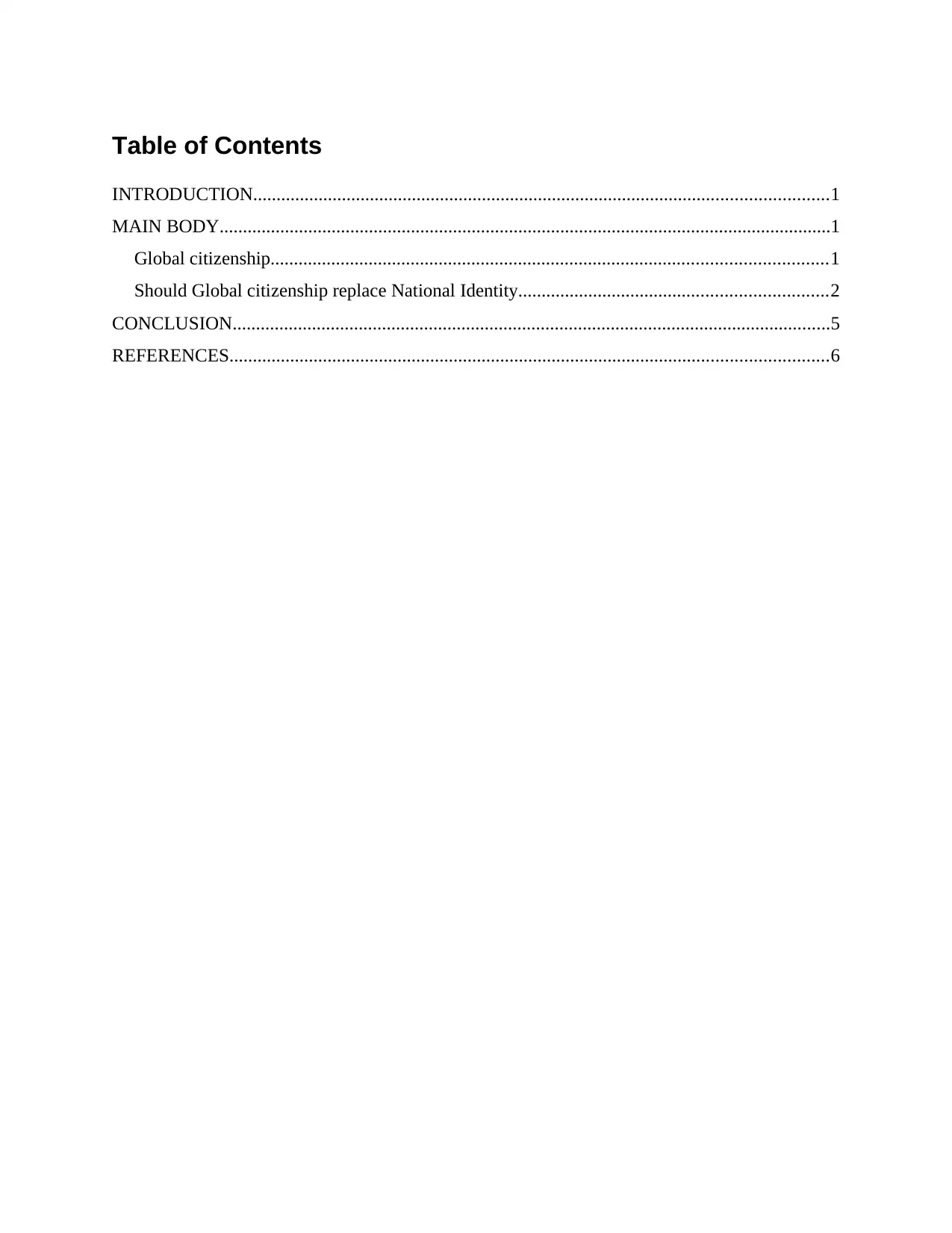
Table of Contents
INTRODUCTION...........................................................................................................................1
MAIN BODY...................................................................................................................................1
Global citizenship.......................................................................................................................1
Should Global citizenship replace National Identity..................................................................2
CONCLUSION................................................................................................................................5
REFERENCES................................................................................................................................6
INTRODUCTION...........................................................................................................................1
MAIN BODY...................................................................................................................................1
Global citizenship.......................................................................................................................1
Should Global citizenship replace National Identity..................................................................2
CONCLUSION................................................................................................................................5
REFERENCES................................................................................................................................6
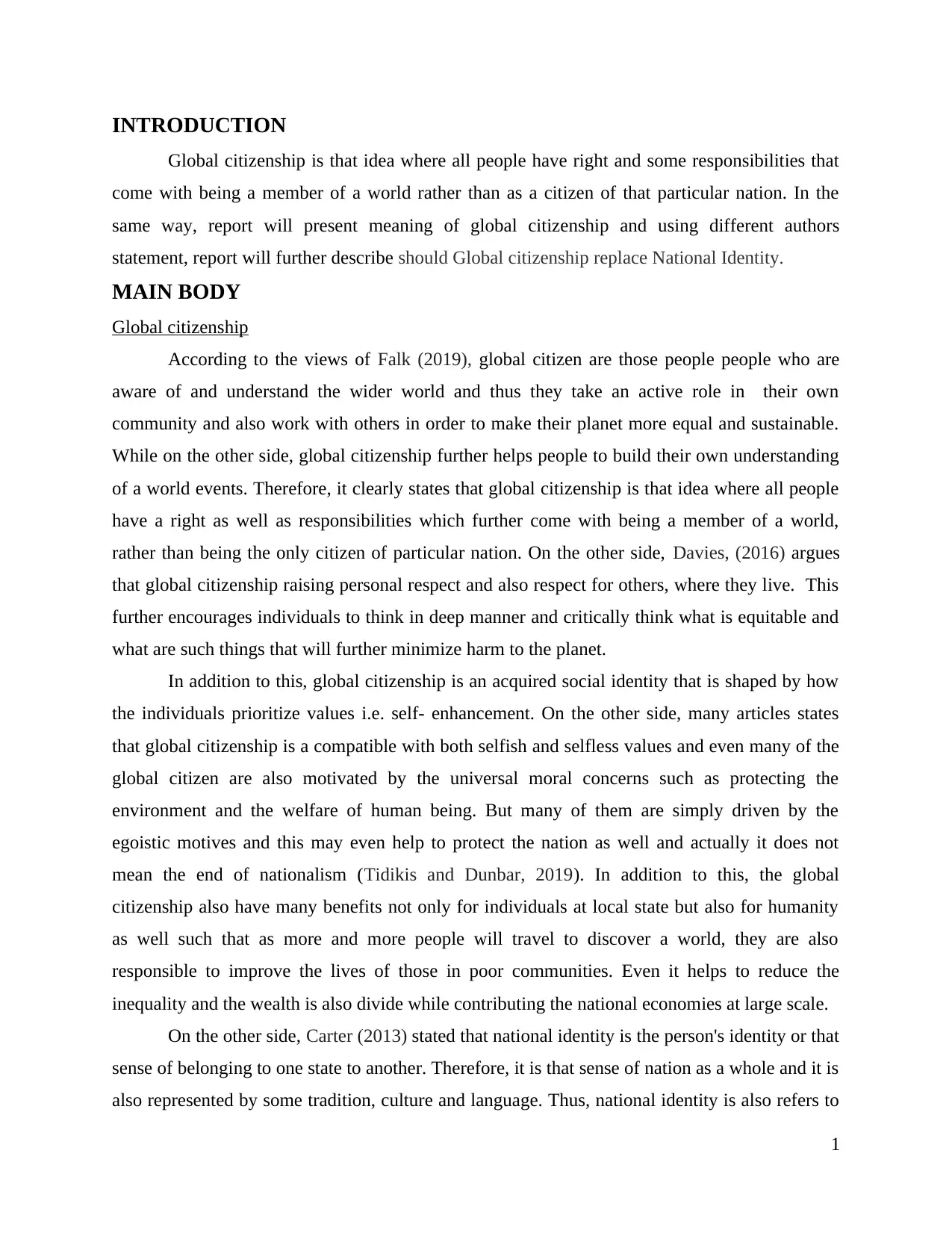
INTRODUCTION
Global citizenship is that idea where all people have right and some responsibilities that
come with being a member of a world rather than as a citizen of that particular nation. In the
same way, report will present meaning of global citizenship and using different authors
statement, report will further describe should Global citizenship replace National Identity.
MAIN BODY
Global citizenship
According to the views of Falk (2019), global citizen are those people people who are
aware of and understand the wider world and thus they take an active role in their own
community and also work with others in order to make their planet more equal and sustainable.
While on the other side, global citizenship further helps people to build their own understanding
of a world events. Therefore, it clearly states that global citizenship is that idea where all people
have a right as well as responsibilities which further come with being a member of a world,
rather than being the only citizen of particular nation. On the other side, Davies, (2016) argues
that global citizenship raising personal respect and also respect for others, where they live. This
further encourages individuals to think in deep manner and critically think what is equitable and
what are such things that will further minimize harm to the planet.
In addition to this, global citizenship is an acquired social identity that is shaped by how
the individuals prioritize values i.e. self- enhancement. On the other side, many articles states
that global citizenship is a compatible with both selfish and selfless values and even many of the
global citizen are also motivated by the universal moral concerns such as protecting the
environment and the welfare of human being. But many of them are simply driven by the
egoistic motives and this may even help to protect the nation as well and actually it does not
mean the end of nationalism (Tidikis and Dunbar, 2019). In addition to this, the global
citizenship also have many benefits not only for individuals at local state but also for humanity
as well such that as more and more people will travel to discover a world, they are also
responsible to improve the lives of those in poor communities. Even it helps to reduce the
inequality and the wealth is also divide while contributing the national economies at large scale.
On the other side, Carter (2013) stated that national identity is the person's identity or that
sense of belonging to one state to another. Therefore, it is that sense of nation as a whole and it is
also represented by some tradition, culture and language. Thus, national identity is also refers to
1
Global citizenship is that idea where all people have right and some responsibilities that
come with being a member of a world rather than as a citizen of that particular nation. In the
same way, report will present meaning of global citizenship and using different authors
statement, report will further describe should Global citizenship replace National Identity.
MAIN BODY
Global citizenship
According to the views of Falk (2019), global citizen are those people people who are
aware of and understand the wider world and thus they take an active role in their own
community and also work with others in order to make their planet more equal and sustainable.
While on the other side, global citizenship further helps people to build their own understanding
of a world events. Therefore, it clearly states that global citizenship is that idea where all people
have a right as well as responsibilities which further come with being a member of a world,
rather than being the only citizen of particular nation. On the other side, Davies, (2016) argues
that global citizenship raising personal respect and also respect for others, where they live. This
further encourages individuals to think in deep manner and critically think what is equitable and
what are such things that will further minimize harm to the planet.
In addition to this, global citizenship is an acquired social identity that is shaped by how
the individuals prioritize values i.e. self- enhancement. On the other side, many articles states
that global citizenship is a compatible with both selfish and selfless values and even many of the
global citizen are also motivated by the universal moral concerns such as protecting the
environment and the welfare of human being. But many of them are simply driven by the
egoistic motives and this may even help to protect the nation as well and actually it does not
mean the end of nationalism (Tidikis and Dunbar, 2019). In addition to this, the global
citizenship also have many benefits not only for individuals at local state but also for humanity
as well such that as more and more people will travel to discover a world, they are also
responsible to improve the lives of those in poor communities. Even it helps to reduce the
inequality and the wealth is also divide while contributing the national economies at large scale.
On the other side, Carter (2013) stated that national identity is the person's identity or that
sense of belonging to one state to another. Therefore, it is that sense of nation as a whole and it is
also represented by some tradition, culture and language. Thus, national identity is also refers to
1
⊘ This is a preview!⊘
Do you want full access?
Subscribe today to unlock all pages.

Trusted by 1+ million students worldwide
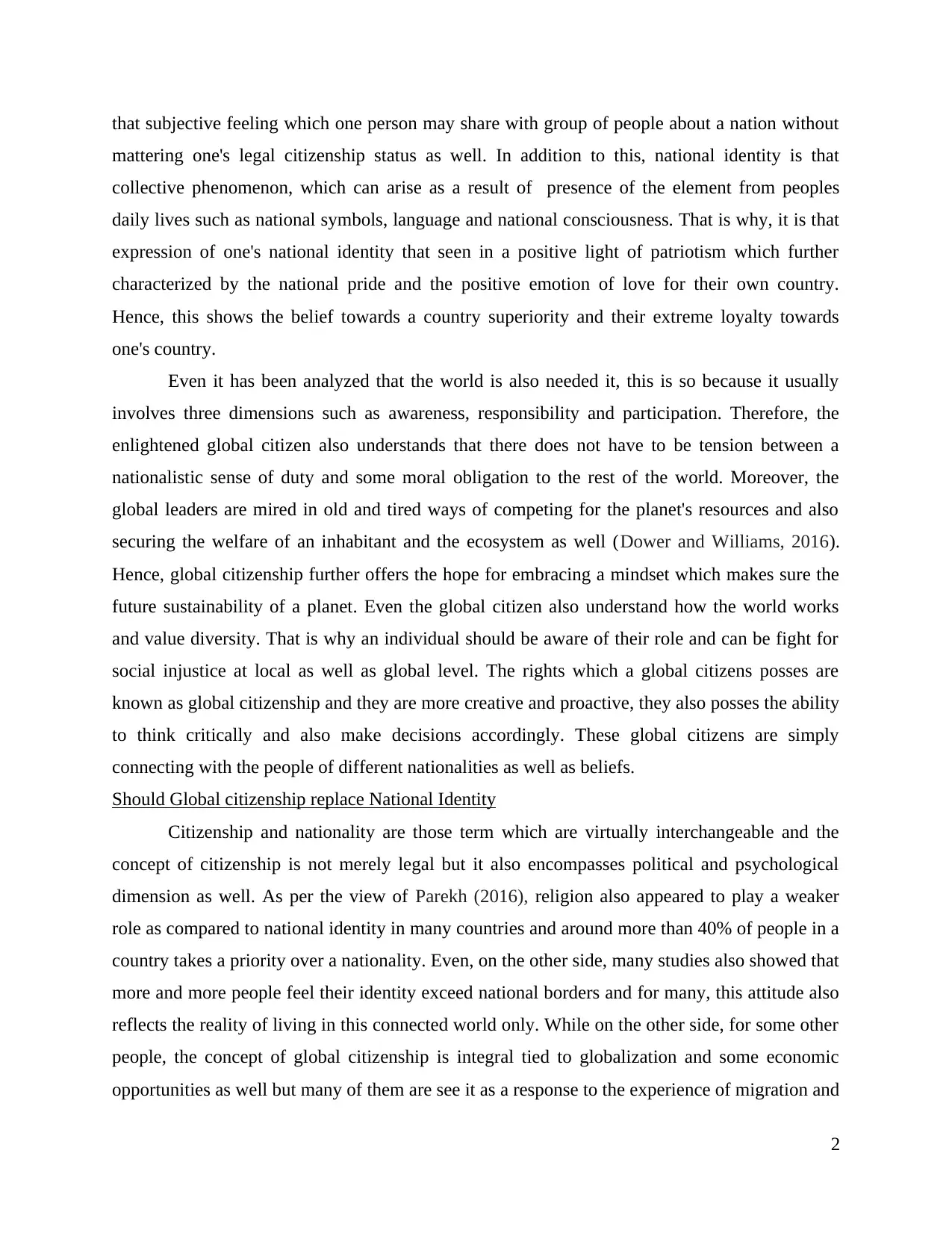
that subjective feeling which one person may share with group of people about a nation without
mattering one's legal citizenship status as well. In addition to this, national identity is that
collective phenomenon, which can arise as a result of presence of the element from peoples
daily lives such as national symbols, language and national consciousness. That is why, it is that
expression of one's national identity that seen in a positive light of patriotism which further
characterized by the national pride and the positive emotion of love for their own country.
Hence, this shows the belief towards a country superiority and their extreme loyalty towards
one's country.
Even it has been analyzed that the world is also needed it, this is so because it usually
involves three dimensions such as awareness, responsibility and participation. Therefore, the
enlightened global citizen also understands that there does not have to be tension between a
nationalistic sense of duty and some moral obligation to the rest of the world. Moreover, the
global leaders are mired in old and tired ways of competing for the planet's resources and also
securing the welfare of an inhabitant and the ecosystem as well (Dower and Williams, 2016).
Hence, global citizenship further offers the hope for embracing a mindset which makes sure the
future sustainability of a planet. Even the global citizen also understand how the world works
and value diversity. That is why an individual should be aware of their role and can be fight for
social injustice at local as well as global level. The rights which a global citizens posses are
known as global citizenship and they are more creative and proactive, they also posses the ability
to think critically and also make decisions accordingly. These global citizens are simply
connecting with the people of different nationalities as well as beliefs.
Should Global citizenship replace National Identity
Citizenship and nationality are those term which are virtually interchangeable and the
concept of citizenship is not merely legal but it also encompasses political and psychological
dimension as well. As per the view of Parekh (2016), religion also appeared to play a weaker
role as compared to national identity in many countries and around more than 40% of people in a
country takes a priority over a nationality. Even, on the other side, many studies also showed that
more and more people feel their identity exceed national borders and for many, this attitude also
reflects the reality of living in this connected world only. While on the other side, for some other
people, the concept of global citizenship is integral tied to globalization and some economic
opportunities as well but many of them are see it as a response to the experience of migration and
2
mattering one's legal citizenship status as well. In addition to this, national identity is that
collective phenomenon, which can arise as a result of presence of the element from peoples
daily lives such as national symbols, language and national consciousness. That is why, it is that
expression of one's national identity that seen in a positive light of patriotism which further
characterized by the national pride and the positive emotion of love for their own country.
Hence, this shows the belief towards a country superiority and their extreme loyalty towards
one's country.
Even it has been analyzed that the world is also needed it, this is so because it usually
involves three dimensions such as awareness, responsibility and participation. Therefore, the
enlightened global citizen also understands that there does not have to be tension between a
nationalistic sense of duty and some moral obligation to the rest of the world. Moreover, the
global leaders are mired in old and tired ways of competing for the planet's resources and also
securing the welfare of an inhabitant and the ecosystem as well (Dower and Williams, 2016).
Hence, global citizenship further offers the hope for embracing a mindset which makes sure the
future sustainability of a planet. Even the global citizen also understand how the world works
and value diversity. That is why an individual should be aware of their role and can be fight for
social injustice at local as well as global level. The rights which a global citizens posses are
known as global citizenship and they are more creative and proactive, they also posses the ability
to think critically and also make decisions accordingly. These global citizens are simply
connecting with the people of different nationalities as well as beliefs.
Should Global citizenship replace National Identity
Citizenship and nationality are those term which are virtually interchangeable and the
concept of citizenship is not merely legal but it also encompasses political and psychological
dimension as well. As per the view of Parekh (2016), religion also appeared to play a weaker
role as compared to national identity in many countries and around more than 40% of people in a
country takes a priority over a nationality. Even, on the other side, many studies also showed that
more and more people feel their identity exceed national borders and for many, this attitude also
reflects the reality of living in this connected world only. While on the other side, for some other
people, the concept of global citizenship is integral tied to globalization and some economic
opportunities as well but many of them are see it as a response to the experience of migration and
2
Paraphrase This Document
Need a fresh take? Get an instant paraphrase of this document with our AI Paraphraser
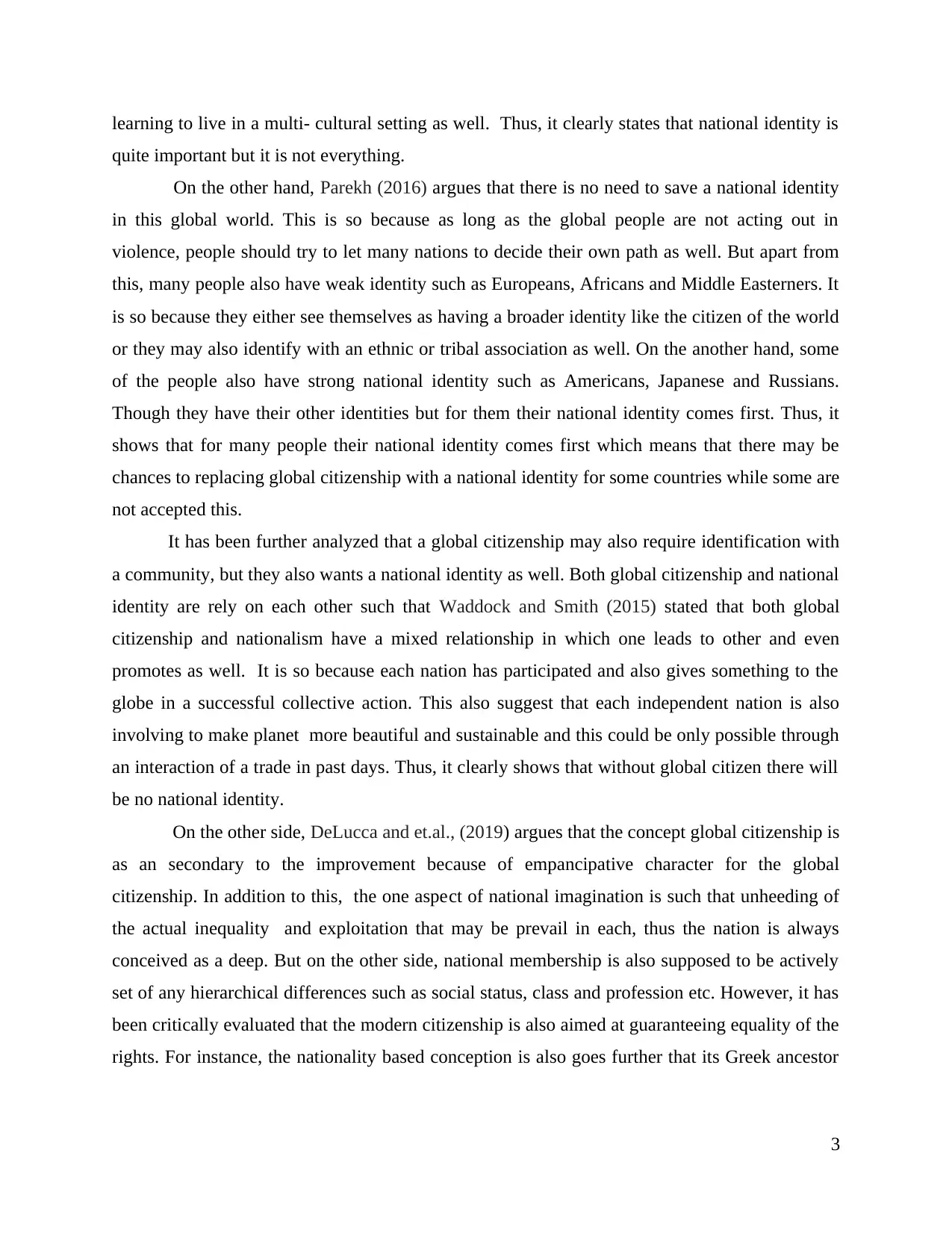
learning to live in a multi- cultural setting as well. Thus, it clearly states that national identity is
quite important but it is not everything.
On the other hand, Parekh (2016) argues that there is no need to save a national identity
in this global world. This is so because as long as the global people are not acting out in
violence, people should try to let many nations to decide their own path as well. But apart from
this, many people also have weak identity such as Europeans, Africans and Middle Easterners. It
is so because they either see themselves as having a broader identity like the citizen of the world
or they may also identify with an ethnic or tribal association as well. On the another hand, some
of the people also have strong national identity such as Americans, Japanese and Russians.
Though they have their other identities but for them their national identity comes first. Thus, it
shows that for many people their national identity comes first which means that there may be
chances to replacing global citizenship with a national identity for some countries while some are
not accepted this.
It has been further analyzed that a global citizenship may also require identification with
a community, but they also wants a national identity as well. Both global citizenship and national
identity are rely on each other such that Waddock and Smith (2015) stated that both global
citizenship and nationalism have a mixed relationship in which one leads to other and even
promotes as well. It is so because each nation has participated and also gives something to the
globe in a successful collective action. This also suggest that each independent nation is also
involving to make planet more beautiful and sustainable and this could be only possible through
an interaction of a trade in past days. Thus, it clearly shows that without global citizen there will
be no national identity.
On the other side, DeLucca and et.al., (2019) argues that the concept global citizenship is
as an secondary to the improvement because of empancipative character for the global
citizenship. In addition to this, the one aspect of national imagination is such that unheeding of
the actual inequality and exploitation that may be prevail in each, thus the nation is always
conceived as a deep. But on the other side, national membership is also supposed to be actively
set of any hierarchical differences such as social status, class and profession etc. However, it has
been critically evaluated that the modern citizenship is also aimed at guaranteeing equality of the
rights. For instance, the nationality based conception is also goes further that its Greek ancestor
3
quite important but it is not everything.
On the other hand, Parekh (2016) argues that there is no need to save a national identity
in this global world. This is so because as long as the global people are not acting out in
violence, people should try to let many nations to decide their own path as well. But apart from
this, many people also have weak identity such as Europeans, Africans and Middle Easterners. It
is so because they either see themselves as having a broader identity like the citizen of the world
or they may also identify with an ethnic or tribal association as well. On the another hand, some
of the people also have strong national identity such as Americans, Japanese and Russians.
Though they have their other identities but for them their national identity comes first. Thus, it
shows that for many people their national identity comes first which means that there may be
chances to replacing global citizenship with a national identity for some countries while some are
not accepted this.
It has been further analyzed that a global citizenship may also require identification with
a community, but they also wants a national identity as well. Both global citizenship and national
identity are rely on each other such that Waddock and Smith (2015) stated that both global
citizenship and nationalism have a mixed relationship in which one leads to other and even
promotes as well. It is so because each nation has participated and also gives something to the
globe in a successful collective action. This also suggest that each independent nation is also
involving to make planet more beautiful and sustainable and this could be only possible through
an interaction of a trade in past days. Thus, it clearly shows that without global citizen there will
be no national identity.
On the other side, DeLucca and et.al., (2019) argues that the concept global citizenship is
as an secondary to the improvement because of empancipative character for the global
citizenship. In addition to this, the one aspect of national imagination is such that unheeding of
the actual inequality and exploitation that may be prevail in each, thus the nation is always
conceived as a deep. But on the other side, national membership is also supposed to be actively
set of any hierarchical differences such as social status, class and profession etc. However, it has
been critically evaluated that the modern citizenship is also aimed at guaranteeing equality of the
rights. For instance, the nationality based conception is also goes further that its Greek ancestor
3
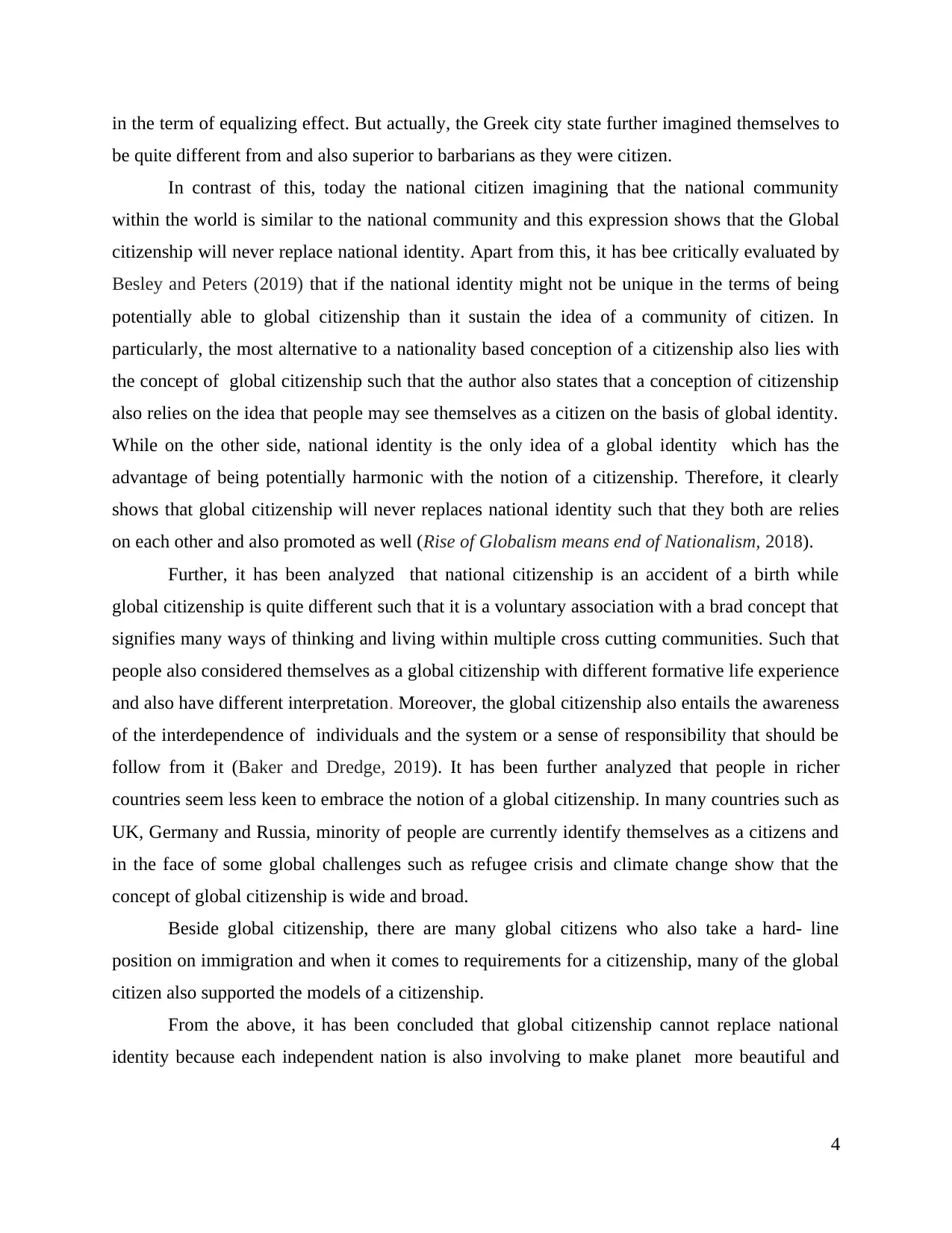
in the term of equalizing effect. But actually, the Greek city state further imagined themselves to
be quite different from and also superior to barbarians as they were citizen.
In contrast of this, today the national citizen imagining that the national community
within the world is similar to the national community and this expression shows that the Global
citizenship will never replace national identity. Apart from this, it has bee critically evaluated by
Besley and Peters (2019) that if the national identity might not be unique in the terms of being
potentially able to global citizenship than it sustain the idea of a community of citizen. In
particularly, the most alternative to a nationality based conception of a citizenship also lies with
the concept of global citizenship such that the author also states that a conception of citizenship
also relies on the idea that people may see themselves as a citizen on the basis of global identity.
While on the other side, national identity is the only idea of a global identity which has the
advantage of being potentially harmonic with the notion of a citizenship. Therefore, it clearly
shows that global citizenship will never replaces national identity such that they both are relies
on each other and also promoted as well (Rise of Globalism means end of Nationalism, 2018).
Further, it has been analyzed that national citizenship is an accident of a birth while
global citizenship is quite different such that it is a voluntary association with a brad concept that
signifies many ways of thinking and living within multiple cross cutting communities. Such that
people also considered themselves as a global citizenship with different formative life experience
and also have different interpretation. Moreover, the global citizenship also entails the awareness
of the interdependence of individuals and the system or a sense of responsibility that should be
follow from it (Baker and Dredge, 2019). It has been further analyzed that people in richer
countries seem less keen to embrace the notion of a global citizenship. In many countries such as
UK, Germany and Russia, minority of people are currently identify themselves as a citizens and
in the face of some global challenges such as refugee crisis and climate change show that the
concept of global citizenship is wide and broad.
Beside global citizenship, there are many global citizens who also take a hard- line
position on immigration and when it comes to requirements for a citizenship, many of the global
citizen also supported the models of a citizenship.
From the above, it has been concluded that global citizenship cannot replace national
identity because each independent nation is also involving to make planet more beautiful and
4
be quite different from and also superior to barbarians as they were citizen.
In contrast of this, today the national citizen imagining that the national community
within the world is similar to the national community and this expression shows that the Global
citizenship will never replace national identity. Apart from this, it has bee critically evaluated by
Besley and Peters (2019) that if the national identity might not be unique in the terms of being
potentially able to global citizenship than it sustain the idea of a community of citizen. In
particularly, the most alternative to a nationality based conception of a citizenship also lies with
the concept of global citizenship such that the author also states that a conception of citizenship
also relies on the idea that people may see themselves as a citizen on the basis of global identity.
While on the other side, national identity is the only idea of a global identity which has the
advantage of being potentially harmonic with the notion of a citizenship. Therefore, it clearly
shows that global citizenship will never replaces national identity such that they both are relies
on each other and also promoted as well (Rise of Globalism means end of Nationalism, 2018).
Further, it has been analyzed that national citizenship is an accident of a birth while
global citizenship is quite different such that it is a voluntary association with a brad concept that
signifies many ways of thinking and living within multiple cross cutting communities. Such that
people also considered themselves as a global citizenship with different formative life experience
and also have different interpretation. Moreover, the global citizenship also entails the awareness
of the interdependence of individuals and the system or a sense of responsibility that should be
follow from it (Baker and Dredge, 2019). It has been further analyzed that people in richer
countries seem less keen to embrace the notion of a global citizenship. In many countries such as
UK, Germany and Russia, minority of people are currently identify themselves as a citizens and
in the face of some global challenges such as refugee crisis and climate change show that the
concept of global citizenship is wide and broad.
Beside global citizenship, there are many global citizens who also take a hard- line
position on immigration and when it comes to requirements for a citizenship, many of the global
citizen also supported the models of a citizenship.
From the above, it has been concluded that global citizenship cannot replace national
identity because each independent nation is also involving to make planet more beautiful and
4
⊘ This is a preview!⊘
Do you want full access?
Subscribe today to unlock all pages.

Trusted by 1+ million students worldwide
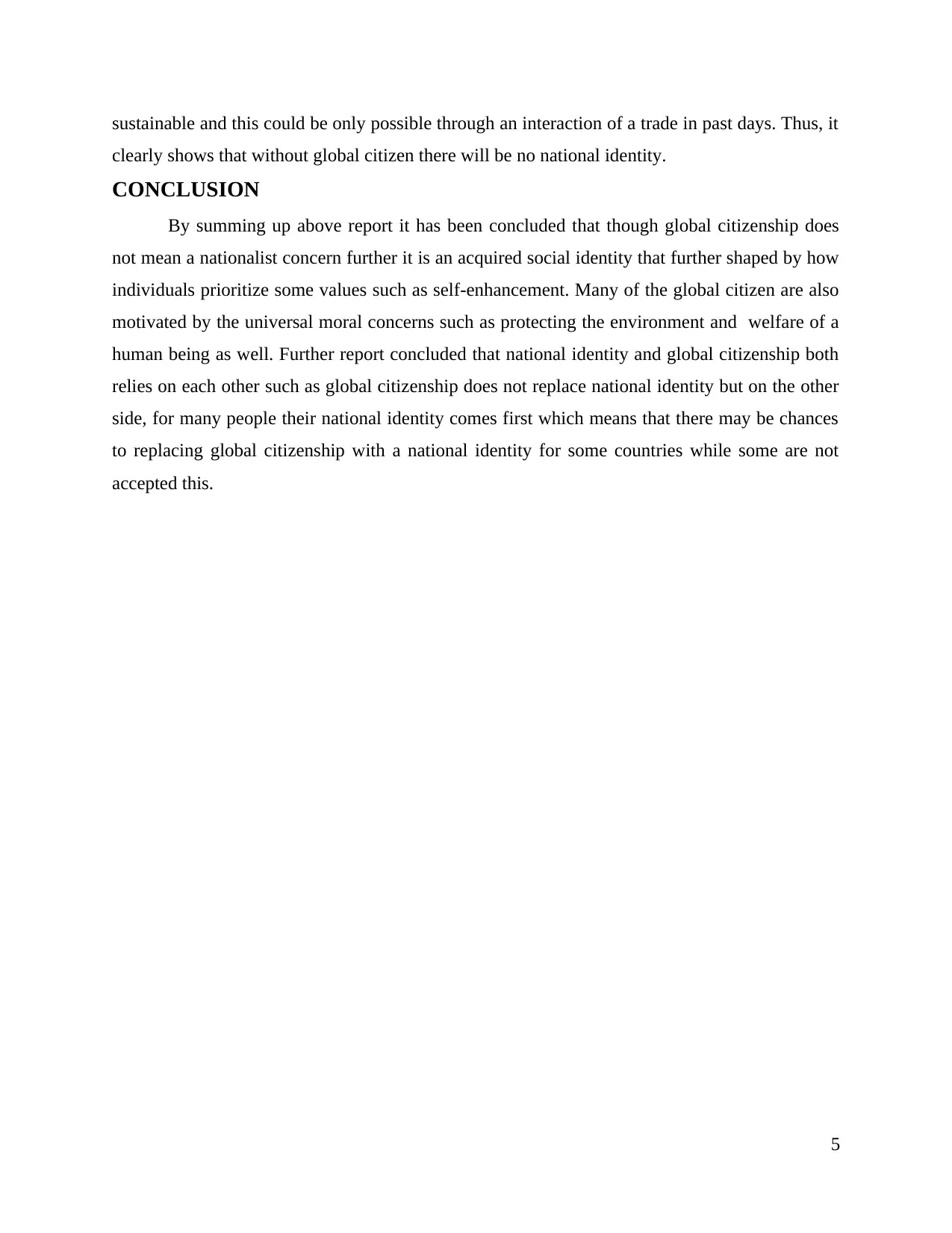
sustainable and this could be only possible through an interaction of a trade in past days. Thus, it
clearly shows that without global citizen there will be no national identity.
CONCLUSION
By summing up above report it has been concluded that though global citizenship does
not mean a nationalist concern further it is an acquired social identity that further shaped by how
individuals prioritize some values such as self-enhancement. Many of the global citizen are also
motivated by the universal moral concerns such as protecting the environment and welfare of a
human being as well. Further report concluded that national identity and global citizenship both
relies on each other such as global citizenship does not replace national identity but on the other
side, for many people their national identity comes first which means that there may be chances
to replacing global citizenship with a national identity for some countries while some are not
accepted this.
5
clearly shows that without global citizen there will be no national identity.
CONCLUSION
By summing up above report it has been concluded that though global citizenship does
not mean a nationalist concern further it is an acquired social identity that further shaped by how
individuals prioritize some values such as self-enhancement. Many of the global citizen are also
motivated by the universal moral concerns such as protecting the environment and welfare of a
human being as well. Further report concluded that national identity and global citizenship both
relies on each other such as global citizenship does not replace national identity but on the other
side, for many people their national identity comes first which means that there may be chances
to replacing global citizenship with a national identity for some countries while some are not
accepted this.
5
Paraphrase This Document
Need a fresh take? Get an instant paraphrase of this document with our AI Paraphraser
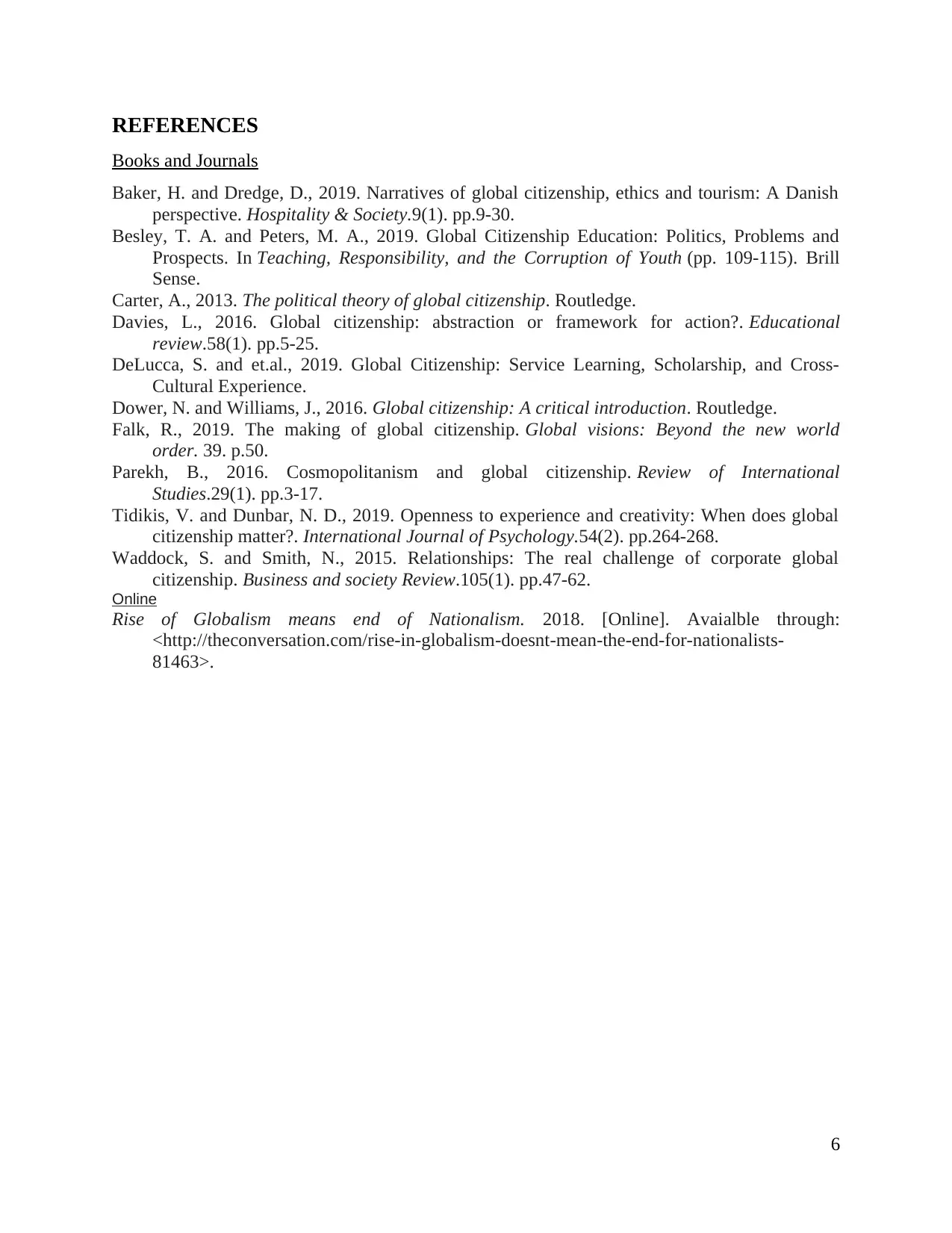
REFERENCES
Books and Journals
Baker, H. and Dredge, D., 2019. Narratives of global citizenship, ethics and tourism: A Danish
perspective. Hospitality & Society.9(1). pp.9-30.
Besley, T. A. and Peters, M. A., 2019. Global Citizenship Education: Politics, Problems and
Prospects. In Teaching, Responsibility, and the Corruption of Youth (pp. 109-115). Brill
Sense.
Carter, A., 2013. The political theory of global citizenship. Routledge.
Davies, L., 2016. Global citizenship: abstraction or framework for action?. Educational
review.58(1). pp.5-25.
DeLucca, S. and et.al., 2019. Global Citizenship: Service Learning, Scholarship, and Cross-
Cultural Experience.
Dower, N. and Williams, J., 2016. Global citizenship: A critical introduction. Routledge.
Falk, R., 2019. The making of global citizenship. Global visions: Beyond the new world
order. 39. p.50.
Parekh, B., 2016. Cosmopolitanism and global citizenship. Review of International
Studies.29(1). pp.3-17.
Tidikis, V. and Dunbar, N. D., 2019. Openness to experience and creativity: When does global
citizenship matter?. International Journal of Psychology.54(2). pp.264-268.
Waddock, S. and Smith, N., 2015. Relationships: The real challenge of corporate global
citizenship. Business and society Review.105(1). pp.47-62.
Online
Rise of Globalism means end of Nationalism. 2018. [Online]. Avaialble through:
<http://theconversation.com/rise-in-globalism-doesnt-mean-the-end-for-nationalists-
81463>.
6
Books and Journals
Baker, H. and Dredge, D., 2019. Narratives of global citizenship, ethics and tourism: A Danish
perspective. Hospitality & Society.9(1). pp.9-30.
Besley, T. A. and Peters, M. A., 2019. Global Citizenship Education: Politics, Problems and
Prospects. In Teaching, Responsibility, and the Corruption of Youth (pp. 109-115). Brill
Sense.
Carter, A., 2013. The political theory of global citizenship. Routledge.
Davies, L., 2016. Global citizenship: abstraction or framework for action?. Educational
review.58(1). pp.5-25.
DeLucca, S. and et.al., 2019. Global Citizenship: Service Learning, Scholarship, and Cross-
Cultural Experience.
Dower, N. and Williams, J., 2016. Global citizenship: A critical introduction. Routledge.
Falk, R., 2019. The making of global citizenship. Global visions: Beyond the new world
order. 39. p.50.
Parekh, B., 2016. Cosmopolitanism and global citizenship. Review of International
Studies.29(1). pp.3-17.
Tidikis, V. and Dunbar, N. D., 2019. Openness to experience and creativity: When does global
citizenship matter?. International Journal of Psychology.54(2). pp.264-268.
Waddock, S. and Smith, N., 2015. Relationships: The real challenge of corporate global
citizenship. Business and society Review.105(1). pp.47-62.
Online
Rise of Globalism means end of Nationalism. 2018. [Online]. Avaialble through:
<http://theconversation.com/rise-in-globalism-doesnt-mean-the-end-for-nationalists-
81463>.
6
1 out of 8
Related Documents
Your All-in-One AI-Powered Toolkit for Academic Success.
+13062052269
info@desklib.com
Available 24*7 on WhatsApp / Email
![[object Object]](/_next/static/media/star-bottom.7253800d.svg)
Unlock your academic potential
Copyright © 2020–2026 A2Z Services. All Rights Reserved. Developed and managed by ZUCOL.




